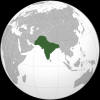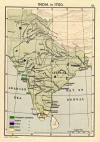Why did the Turkic Mughal Empire Collapse?
The Mughal Empire was an
early-modern empire that controlled much of South Asia between the 16th
and 19th centuries. For some two hundred years, the empire stretched
from the outer fringes of the Indus river basin in the west, northern
Afghanistan in the northwest, and Kashmir in the north, to the highlands
of present-day Assam and Bangladesh in the east, and the uplands of the
Deccan plateau in south India.
The Mughal empire is conventionally said to have been founded in 1526 by
Babur, a warrior chieftain from what today is Uzbekistan, who employed
aid from the neighboring Safavid and Ottoman empires, to defeat the
Sultan of Delhi, Ibrahim Lodhi, in the First Battle of Panipat, and to
sweep down the plains of Upper India. The Mughal imperial structure,
however, is sometimes dated to 1600, to the rule of Babur's grandson,
Akbar. This imperial structure lasted until 1720, until shortly after
the death of the last major emperor, Aurangzeb, during whose reign the
empire also achieved its maximum geographical extent. Reduced
subsequently, especially during the East India Company rule in India, to
the region in and around Old Delhi, the empire was formally dissolved by
the British Raj after the Indian Rebellion of 1857.
Although the Mughal empire
was created and sustained by military warfare, it did not vigorously
suppress the cultures and peoples it came to rule; rather it equalized
and placated them through new administrative practices, and diverse
ruling elites, leading to more efficient, centralised, and standardized
rule. The base of the empire's collective wealth was agricultural taxes,
instituted by the third Mughal emperor, Akbar. These taxes, which
amounted to well over half the output of a peasant cultivator, were paid
in the well-regulated silver currency, and caused peasants and artisans
to enter larger markets.
The relative peace maintained by the empire during much of the 17th
century was a factor in India's economic expansion. Burgeoning European
presence in the Indian Ocean, and its increasing demand for Indian raw
and finished products, created still greater wealth in the Mughal
courts. There was more conspicuous consumption among the Mughal elite,
resulting in greater patronage of painting, literary forms, textiles,
and architecture, especially during the reign of Shah Jahan. Among the
Mughal UNESCO World Heritage Sites in South Asia are: Agra Fort,
Fatehpur Sikri, Red Fort, Humayun's Tomb, Lahore Fort, Shalamar Gardens
and the Taj Mahal, which is described as "the jewel of Muslim art in
India, and one of the universally admired masterpieces of the world's
heritage."
About TransAnatolie
TransAnatolie
Tour (Multi-Lingual Cultural Tour Operator)
TransAnatolie Tour is a subgroup of Anadolu
and is a Multi-Lingual Cultural Tour Operator in Anatolia (Asia
Minor) Turkey.TransAnatolie Tour
has the ambition and the capacity to be become one of the leading provider and
operator of archaeological, historical, belief (biblical) and cultural
heritage tours and specialty travel with high Quality of Service (QoS)
concept.
TransAnatolie Tour develops its programs with a network of
Specialists, who are well recognized, local, regional, national, and international
professionals at the top of their fields. These Specialists share their
knowledge, insights and vision providing an in-depth insiders understanding of
what distinguishes a particular culture and what factors shaped its evolution.
TransAnatolie Tours are executed in five
languages (Dutch, English, French, German and Turkish) with high QoS concept
by Tourism Professionals of valuable experience, intelligence and high
intellectual capacity.
TransAnatolie Tour executive and operations
teams have been at the cutting edge of international tour (holiday) operations
and specialty travel since 1990s, working with organizations, universities and
museums to provide unique travel experiences, cultural and belief (biblical) tours
(holidays/trips) to their memberships.
Multi-Lingual TransAnatolie Tour team members
have many years of valuable experience in providing individuals and
organizations with high quality cultural, historical, belief/biblical,
archaeological, architectural tours and travel experiences with high quality of
service (QoS).
TransAnatolie has immersed travelers in
Anatolia's most fascinating ancient cultures and provided enriching travel
experiences.
TransAnatolie (International Multi-Lingual
Cultural Tour Operator) has also been in small boat cruises, building exciting
travel packages around these unique vessels.
TransAnatolie is now
expanding its distribution by making these high quality, unique travel
products and programs available to the public. Supported by our international
network of offices and affiliates worldwide, the aim of TransAnatolie Team of
travel professionals and passionate program specialists is to make your next
'vacation' a truly rewarding travel experience.
TransAnatolie Tour is a member of
-
Turkish Ministry of Culture and Tourism (Licence
No. 4938)
-
Ankara Chamber of Commerce (Trade registry under
No. 54/1024)
-
Turkish-French Cultural Association
-
Turkish Association at the United Nations
-
Union of Turkish Tour Operators (TÜRSAB)
-
Union of Multi-Lingual Professional Tourism Guides (TUREB-ARED)
-
Ankara Cultural Tourism Association (BATUDER)
-
Nigde Cultural Association
-
Aksaray Cultural Association
-
Arts & Cultural Association of Taspinar.
TransAnatolie info-webs
(pages)
On these webs you will find background
information about our company, our offices, our current job offers and more info
about current and future products and services.
If you could not find the information you need on these pages and/or
on our other
pages, or for inquires please do not hesitate to contact us at:
info[at]transanatolie.com

-
TransAnatolie Tour
-
Multilingual Cultural Tour Provider and Operator
- A - Group
License N°4938 - The Turkish Ministry of Culture and Tourism
|



 |






